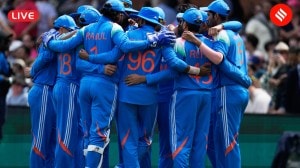`One of the last surviving heros of the Gandhian Revolution’
MUMBAI, AUG 12: Echoes of Vaishnav Jan to Tene Kahiye Je.... competed with the noisy rain-drops falling on Mani Bhavan in south Mumbai whe...

MUMBAI, AUG 12: Echoes of Vaishnav Jan to Tene Kahiye Je…. competed with the noisy rain-drops falling on Mani Bhavan in south Mumbai where admirers, like-minded Gandhians and media representatives, flocked to pay their last respects to the mortal remains of the 81-year old Gandhian leader Dr Usha Mehta. She died at her Opera House residence on the night of August 11.
Active till the very end, she was last seen at the historic August Kranti Maidan on August nine to commemorate the Quit India day. Mehta had played a particularly stellar role during those heady days in 1942 when Mahatma Gandhi gave the clarion call to the British rulers to `Quit India’. She never missed her annual ritual at the Maidan.
Her body was kept in the main hall of Mani Bhavan for over an hour. True to the Gandhian spirit, no elaborate last rites were performed before taking the body to the electric crematorium. Her friends and followers chanted Gandhiji’s bhajans to mourn her death. A variety of visitors present demonstrated the goodwill enjoyed by the Gandhian. While Mumbai University vice-chancellor Bhalchandra Mungekar (first Dalit to assume the post) paid a heart-felt homage, there was ad guru Alyque Padamsee praising her strong belief in non-violence. Nephew, film-maker Ketan Mehta with wife Deepa, paid his respects.
Distinguished people like former police commissioner J F Ribeiro, Congress politician Murli Deora, socialist leaders, Pramila Dandavate and Mrinal Gore, writer-intellectual Pushpa Bhave, Mahatma Gandhi’s grand-daughter Usha Gokani, Save Bombay Committee chairman Kisan Mehta and film-actor Pratap Sharma paid their last respects to the departed Gandhian. Each of them had been touched by Usha Mehta’s gentle personality at some point in their life. Mehta’s interest in several social causes, ranging from Narmada Bachao Andolan to Mumbai University’s book releases to women’s issues, was lauded.
As friend Ushabehn Thakkar of the Gandhi Smarak Nidhi said, “It was more difficult to believe in her death because she was active till the very end. She was going to inaugurate an art exhibition at the Jehangir Art Gallery at the month-end. Besides, she had also agreed to participate in the Kick-Plastic initiative.”
Mani Bhavan office-bearers: Mehta kept herself constructively busy each day of her life, a seminar here or a rally there, and most importantly, she attracted the youth. Little wonder that youngsters, many foreigners, flocked Mani Bhavan to see her for the last time.
writer-intellectual Pushpa Bhave: “She was always young at heart. The revolutionary spirit in her never died. And as luck would have it, she died in the revolution week. She lived a full life.”
Supercop Ribeiro: “It is difficult to imagine Mumbai without Usha Mehta, who was present in and every social-political function. Despite her strong beliefs and conviction, she managed not to hurt anyone. She represented the moral fibre of this city. It is difficult to replace such genuinely nice human beings.”
Alyque Padamsee: The frail, short figure of Usha Mehta was a major source of inspiration for people from various walks of life. Once the Shiv Sena had endorsed constructive violence. She asked me to help organise an all-party public meet at the K C College. She always stood for non-violence, and condemned violence of all kinds. A true satyagrahi, she often took the blows of violence to protect the concept of non-violence.
Pratap Sharma: “She was always willing to help in research work. She helped me a lot when I made films on Gandhiji and Pandit Nehru under the aegis of Mani Bhavan and Gandhi Smarak Nidhi. Her suggestions were of immense help.”
Vice-chancellor Mungekar: Mehta was an immensely likeable personality. Modest, honest and secular to the core, Ushabehn has set an example for Indians. Contemporary times need selfless people like Ushabehn. We need human beings like her who never hurt anyone’s sentiments and yet drive home the message.”
Governor P C Alexander: One of the last surviving heroes of the Gandhian revolution has now passed into history. For Dr Usha Mehta, the revolution did not stop with the attainment of freedom. Many battles remained for her to be fought and won like the empowerment of women, upliftment of disadvantaged classes in society, elimination of communalism and promotion of integrity in public life. We will badly miss the eloquence and powerful voice of that frail person in support of all good causes in Mumbai.



- 01
- 02
- 03
- 04
- 05


























